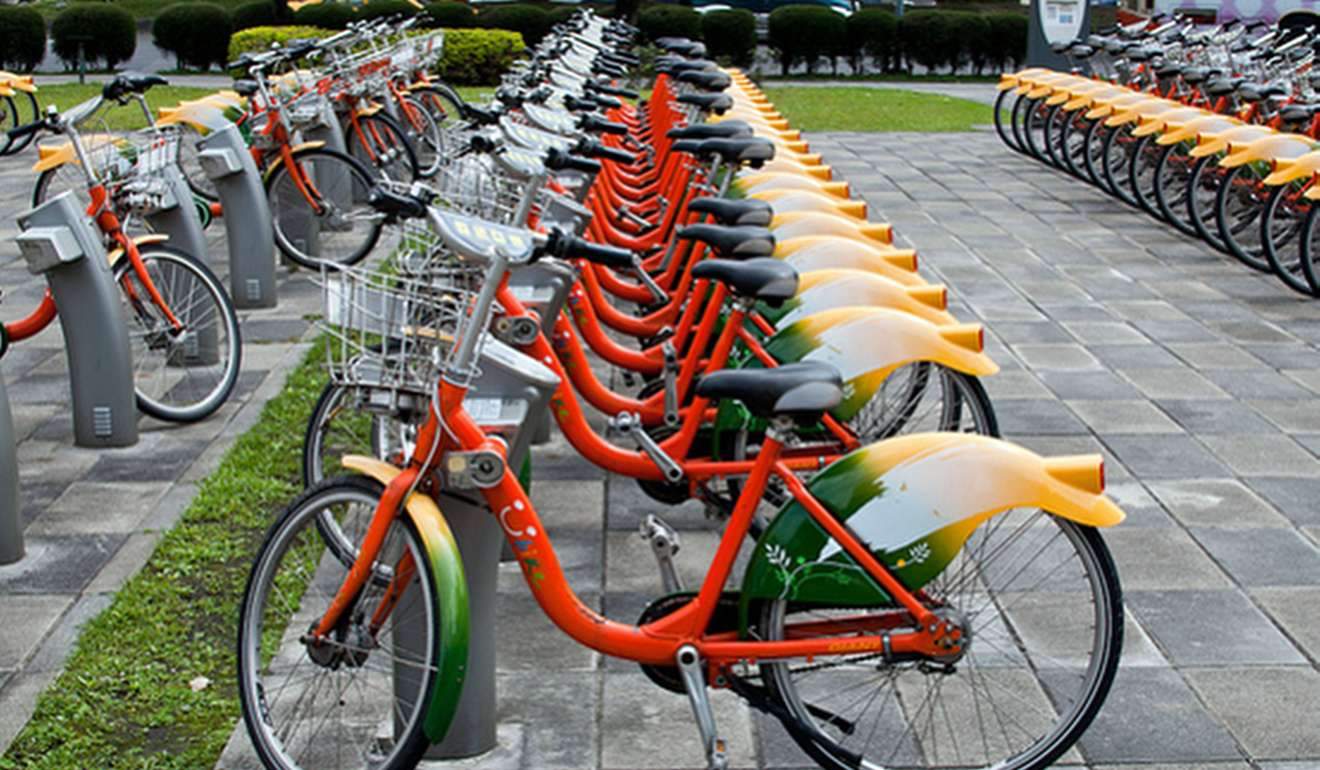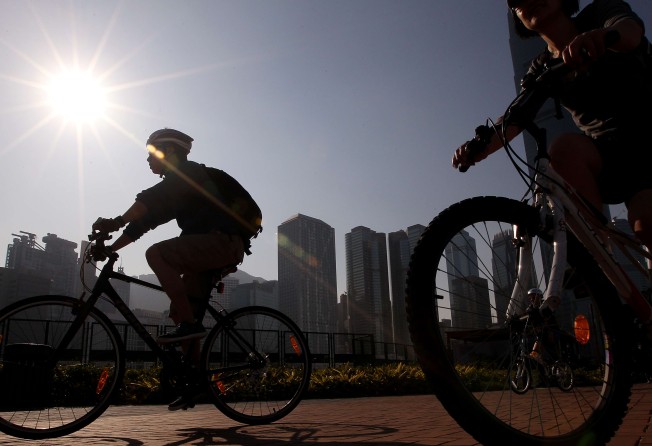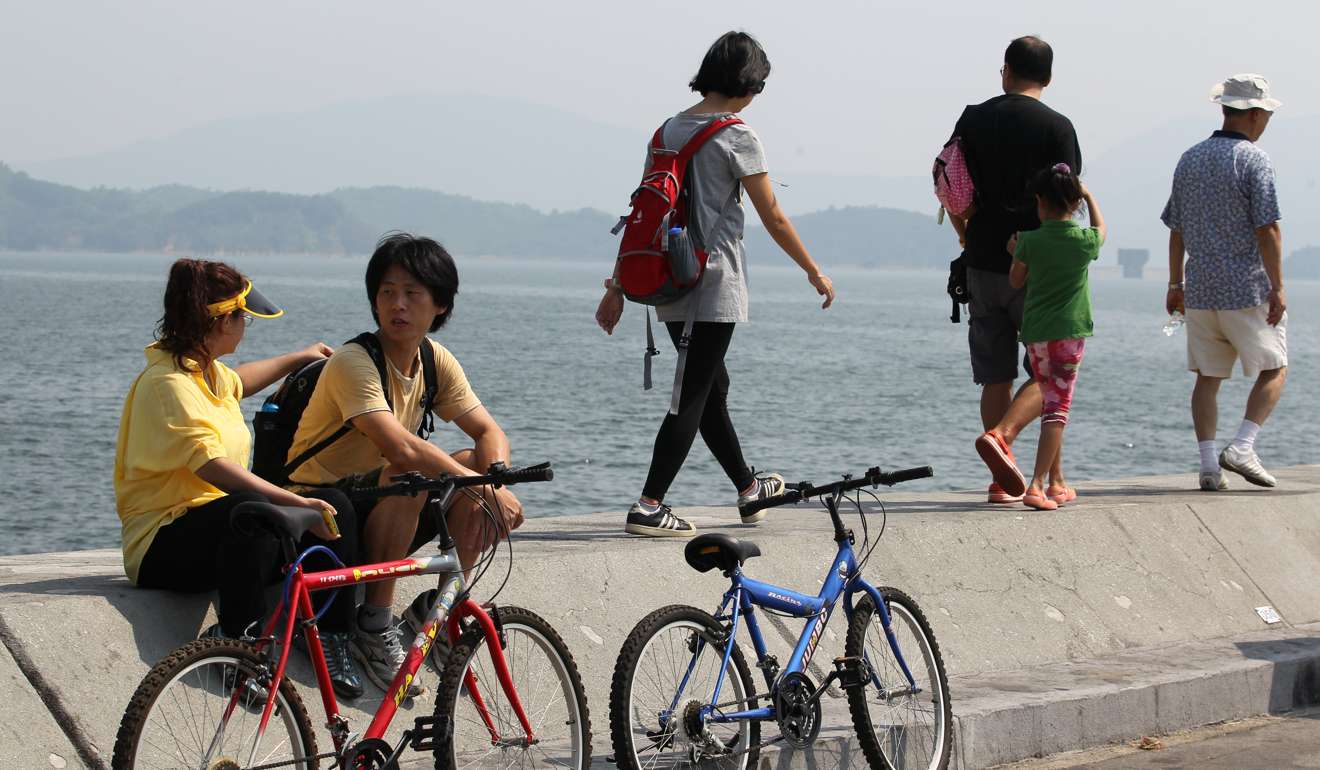
Get on your bike: calls for bigger push to make Hong Kong more cycle-friendly
Campaigners say Hong Kong should look to Taiwan for biking inspiration

There are 57,700 public bicycle parking spaces in Hong Kong, according to the government, but it seems hardly any of them are being used on a daily basis.
Cycling campaigners have long warned Hong Kong is slipping behind other international cities when it comes to bicycle-friendly initiatives; they estimate there could be fewer than 10,000 people who make their entire daily commute to work or school by bike.
They maintain this is particularly concerning given the city’s rising number of private car owners and increasing air pollution problems.
In his final policy address as chief executive, Leung Chun-ying this year reiterated the government’s commitment to make Hong Kong more bicycle-friendly.
Lawmakers certainly appear committed to developing cycle lanes in new developments, such as Yuen Long South and Hung Shui Kiu, and have invested considerably in purpose-built cycle track venues. But they have emphasised their reluctance to modernise existing urban areas to make them bicycle-friendly. Historically, the authorities have also warned against cycling on the city’s roads, suggesting they are too congested and dangerous.
William Fung, an architect and co-founder of campaign group City Cycling Action, said the government desperately needs to revise its approach and should look to Taiwan, specifically Taipei, for cycling inspiration.
“Taiwan is doing a great job,” he said. “They have bicycle lanes on the main road, and sometimes allow bikes to ride on the pavement. They also have a good urban bike renting system. All these policies show they have a more environmentally-friendly lifestyle in the city. I could imagine Hong Kong could be like that. We really want this to happen and we want to work with the government.”

PEDAL POWER
Lawmakers have pledged to consider the feasibility of incorporating cycle tracks for the future development of harbourfront areas.
On February 28, Fung was part of a group of 100 campaigning cyclists who pedalled from Sheung Wan to Taikoo Place in a bid to promote cycling. It was the final outing in a series of “Morning Ride” events held since October last year, marking a collaboration between cycling activists City Cycling Action, the Hong Kong Cycling Alliance, and cycling lifestyle websites Bike the Moment and Rideout, as campaigners called on the government to introduce more cycling lanes and step up its promotion of cycling.
Members of City Cycling Action plan to produce a report with new cycling proposals, such as introducing simple road markings and signage for bikes, for the government by the end of March.
They want to significantly boost the numbers of commuting cyclists, particularly on Hong Kong Island, where almost 50 per cent of workers do not cross the harbour for their jobs.
Paddy Ng, co-owner of bike shop Wheel Thing Makers and spokesman for City Cycling Action, said the Morning Ride events had reinvigorated their campaign.
He said his group were focusing their efforts on calling for an improved cycle route on Hong Kong Island, specifically between Sheung Wan and Quarry Bay, but admitted space restrictions meant they could not simply demand that developers widen the roads.
“Parts of the route are too narrow,” he said. “We are looking for an alternative solution like bike priority after 7pm. We want to push the government to make such adjustments.”

SAFETY IN NUMBERS
Campaigners also admit Hong Kong’s road users, including cyclists, may need re-educating when it comes to the city’s road safety laws, particularly if the number of cyclists continues to increase.
William Hopkin, a civil engineer and spokesman for Hong Kong Cycling Alliance who has lived in the city for seven years, said while the Morning Ride events were “fantastic” for the promotion of cycling, many drivers still do not realise it is legal to cycle on the roads.
“I cycle from Central to Quarry Bay for work, but I am a confident cyclist,” he said. “I cut my teeth on the mean streets of London and I’m not typical of the type of people we want to attract to cycling. The Morning Ride gave people a sense of safety in numbers.”
In 2015, 10 cyclists died on Hong Kong roads, while 234 were seriously injured and 756 suffered minor injuries, according to statistics from the Transport Department. On cycle tracks, parks, and in open spaces, a further 1,395 cyclists suffered injuries of varying severity. The biggest proportion of all accidents in the same year were suffered by cyclists aged 15 to 29. Meanwhile, in 2014, seven cyclists were killed, five on roads and two on cycle tracks, and six were killed on roads the year before.
Ng of City Cycling Action said the Transport Department often “used increasing road accident deaths as an excuse” to “justify the impossibility” of improving cycling lanes.
But he said by introducing the right measures, and with the support of cyclists and drivers, “we can have a comfortable road experience”.
“With cycling we can reduce some of the burden on public transport,” he said. “Many Hongkongers own bicycles but don’t use them. We cannot only rely on the government; it is not only policy change, we need behavioural change on the roads.”

SLUGGISH BUREAUCRACY
Cyclists have been lobbying the government to make cycle-friendly changes to roads on Hong Kong island, from Kennedy Town to Heng Fa Chuen, for more than 10 years. They estimate journey times from the Central ferry piers to Wan Chai could be as short as five minutes, or about 10 minutes from Central to Kennedy Town, a trip which would normally take about 20 minutes by bus.
They also suggest a citywide bike sharing scheme, such as London’s Santander Cycles, would make it easier for more commuters to occasionally cycle, even if they do not own a bike.
Hong Kong’s cycling facilities were discussed at the Legislative Council on February 8 following a series of questions by Dennis Kwok. The lawmaker criticised the government for failing to take proactive measures to implement its bicycle friendly environment policy to urban areas as well as new towns and developments.
In response, the Secretary for Transport and Housing, Professor Anthony Cheung Bing-leung, said the government “currently does not have plans to designate priority lanes for bicycles in urban areas”, citing the inconvenience it would cause other road users if existing walkways or carriageways had to be narrowed. He said the government “does not encourage” cycling in urban areas because of “road safety considerations”.
He added the government was committed to promoting cycling safety and the benefits of walking to the public, while generally encouraging a reduction on private car usage.
And in response to suggestions from cyclists that Hong Kong’s roads are often blighted with potholes, he said the Highways Department would continue to assess cycle paths once every three months. He said the department was committed to “keep the road surfaces in a serviceable and safe condition” and would “arrange appropriate maintenance works in a timely manner” upon receiving a complaint regarding potholes.
NEW MOMENTUM?
Despite the less than encouraging attitude of some politicians, lawmaker Dr Edward Yiu Chung-yim has thrown his weight behind the pro-cycling campaign.
He admitted the government had been slow until now to implement more bicycle-friendly policies, but said he hopes the number of daily cycling commuters could increase by as much as 500 per cent within the next decade.
He said major cycling infrastructure projects could cost millions of Hong Kong dollars, but making minor adjustments to road markings and signage on Hong Kong Island could cost less than HK$100,000.
“I am very optimistic,” he said. “We are trying to ‘ride it out’ and take action instead of waiting for the government to build cycle lanes. We are not just advocating, we are experimenting. The most important thing is that this is a win-win situation for everyone involved; we are not saying that cyclists have to occupy car lanes, but more and more people might start to see it is environmentally friendly and reducing traffic.”
Yiu, a qualified surveyor who represents the Architectural, Surveying, Planning and Landscape functional constituency, said he was particularly keen to see a citywide bike hire scheme, with bicycles installed at some key MTR stations to enable commuters to complete their entire journey without a petrol-fuelled road vehicle.
He also encouraged more companies to give employees access to showering facilities so that commuters would still be persuaded to cycle during Hong Kong’s most humid weather.
“This is not just the government’s job,” he said. “It is a question of what our city as a whole can do to become more bike-friendly”.